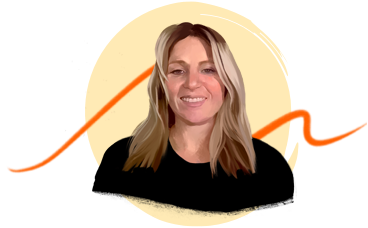Talya is in her late 20s and is always ready for her next travel adventure. Jade is a successful business owner and a mother of 2 boys. Annemarie knows that change is the only constant and isn’t afraid to ride the challenges that come with it. They each have different backgrounds, unique personalities, and their own particular experience living with type 1 Gaucher disease. But there is one characteristic these 3 women have in common: a determination to advocate for themselves in all things related to their condition.
The courage within
Annemarie has gone through many life changes—from beginning college to starting a new job to moving to a new place. These transitions can be emotionally intense for anyone. Now imagine adding type 1 Gaucher disease to the mix. However, Annemarie isn’t one to shy away from challenges. She has risen to the occasion time and again and has learned a thing or two along the way. One clear lesson she’s taken away is the need to stand up for herself—even if it means standing out.
I’ve noticed there can be a sense of wanting to manage things the same way anybody else would. But my circumstances aren’t the same as anybody else’s. Maybe you worry about being different or that there’s something you have to do that other people don’t have to do. But you shouldn’t be afraid that you’re singling yourself out by standing up and asking for what you need.
It’s really important to not be afraid to advocate on your own behalf. I had strong advocates in my parents, and they helped handle all of the logistics for most of my life. But now I’m in a different stage of life and they’re not doing all that for me anymore. Now it’s up to me to be that advocate.
Jade learned about the importance of speaking up early. When she was a child, her Gaucher treatments sometimes caused her to miss classes, and she was falling behind in schoolwork. But Jade’s mom wasn’t about to let that happen. Having her mother advocate for her added support from the school, as well as in the management of her condition helped to get her back on track. And it provided a great example for her to follow.

At school, I was missing classes because of treatment. My mother had to go in and educate on type 1 Gaucher disease and why I may miss classes sometimes due to receiving treatment. She had to advocate for me so that I could keep progressing and be up-to-date like the other kids in my class, even though I was missing school.

The relief that came with support
Being under her parents’ wing meant not having to deal with many of the responsibilities that come with managing Gaucher. But as she grew up, Jade began taking more on—including advocating for herself. But there was a learning curve. One of her biggest lessons was understanding it’s OK to ask for support.
When issues with her insurance company came up, Jade tried problem-solving on her own. But it was a time-consuming and often frustrating process. When she found out there are Case Managers she could reach out to from the pharmaceutical company that provides her medication, she was relieved. The Case Managers know the ins and outs of the health insurance process, and being able to rely on their expertise has been a big help.

When I call the insurance company, I can sit on hold for two, three hours before I even get to a person who can help me. That’s always been difficult and frustrating.
My Case Managers have been a big help with navigating that. They will get on the phone and sit there with me and help me. They’ve been through the process much more, so they know what to ask for.
Like Annemarie and Jade, Talya has learned a few things along her journey that help her be a better advocate for herself.
When I was a kid, I had the best advocate: my mom. I didn’t really have to advocate for myself until I turned 18 and went to college; that was 10 years ago.
I think I’ve certainly gotten better with it just because I’ve gotten more familiar with the way things work, and I now know what’s available and who’s available to help. I think you learn over time as you deal with anything. You learn what’s possible and not possible.
For Talya, being her own best advocate means asking for context around tests or procedures her doctor wants. If her doctor proposes something, she wants to understand why. She isn’t shy about asking questions at her check-ups. Knowing the reason behind each decision helps her be more comfortable with the process.
A lot of times my doctor says things and I may not understand everything that’s being explained. For example, when my doctor wanted to check my breathing rate, I asked why. Sometimes asking questions to get more information helps me. And it’s a good way to advocate for myself.

Self-advocacy is an ongoing process
Talya is confident about voicing her preferences to her nurses. Her assertiveness has proven to be a helpful skill as she balances speaking up for herself with being kind and respectful to the nurses she’s building relationships with.
“When I had new nurses, they would come in and say, ‘Oh, we’re doing it in your left arm.’ I would answer, ‘Well, actually my right hand has better veins,’ but they would push back, insisting on the left arm. I had to stay firm and say, ‘No, I know that my right hand has the best veins.’ I’ve lived in my body for 28 years, and I know what normally works best for me.”
It’s also important to speak up in other situations, such as starting college or a new job. When Jade began school, she wanted to make sure her roommates would be OK having a nurse come in regularly. She proactively explained the situation to her campus administration’s office. They were able to assign roommates who felt comfortable with Jade’s nurse visits. Years later, Jade asked her boss if it was possible to work from home on her treatment days. Her boss agreed, and she was able to feel a little bit more comfortable on those days.

Being part of the community
For Annemarie, Jade, and Talya, years of advocating for themselves have given them the confidence and knowledge to navigate the challenges of living with type 1 Gaucher. And they’re eager to share their experiences with others. Talya, for instance, likes to answer questions in a Facebook support group she joined. Those questions come from people who are going through situations she may have already tackled, and she’s eager to throw light and solidarity their way.

Years ago, I met someone in person from that group. She was a teenager. Her mom saw my response to her question and was like, ‘I want my 15-year-old daughter to see that you can manage this condition. Can we meet and have a cup of coffee and talk?
Staying connected to the community is important to Talya. Support groups have helped her navigate some of the logistical issues around Gaucher, and have even provided emotional support at times. And now she’s more than happy to pay it forward. Talya believes that confidence and kindness are two important ingredients when it comes to advocating for herself or others. Her final word to the wise? Don’t be afraid to ask for what you need.
“My mentality is that it can’t hurt to ask. I certainly can’t think of a situation where you’re going to be worse off by asking. Call your insurance and ask for what you need—worst case, they say no. And when you ask, be firm but be kind.”
Sometimes, standing up for yourself is as simple as asking your doctor about your treatment plan or next test. Other times it means being confident—yet kind—when dealing with an insurance company representative, a school official, or a nurse. Events where you meet others living with Gaucher are opportunities to inspire them to do the same. From small gestures to larger efforts, anything you can do to stand up for yourself or help others along their journey can help make a big difference.

5 ways Annemarie, Jade, and Talya stand up for themselves
Speak up
Voicing your concerns and preferences is an important part of advocating for yourself. Don’t be afraid that standing up means standing out. Your voice matters.
Get informed
At doctor visits, it’s important to ask all your questions about your treatment plan, tests, or anything related to the management of your health. Understanding your condition and the steps being taken to manage it can help you be an informed and active participant in your own care journey.
Find support
Knowing where to find the right support may save you time and spare you unnecessary stress. The Case Managers that work for pharmaceutical companies have knowledge about health insurance processes and lingo and may be helpful if you’re navigating through changes.
Plan ahead
Life changes such as moving, getting married, or starting a new job can bring logistical and emotional challenges. Try to prepare by reaching out to your support network ahead of time. Having the help you’ll need in place can make a big difference.
Connect with the community
Reaching out to support groups in social media and going to local events are great ways of connecting with others living with type 1 Gaucher disease. Some may have had similar experiences and might offer insights. Others might benefit from what you share.
Tagged in: Speaking up, Nurses, Health insurance, Well-being, Community & relationships, College



